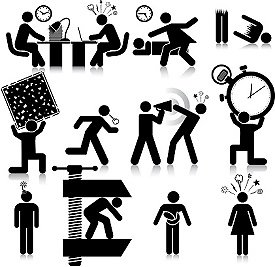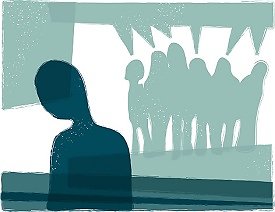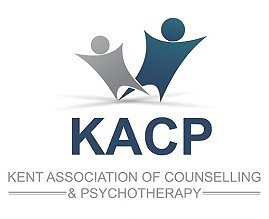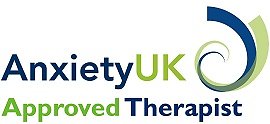Workplace Stress & Bullying
'Stress occurs when an individual perceives an imbalance between the demands placed on them and their ability to cope. It often occurs in situations characterised by low levels of control and support' (Professor Tom Cox University of Nottingham)
Forms of Workplace Stress
Top Professional Stressors:
- Disrespect at the workplace
- Lack of work-life balance
- Overtime – (unrealistic workloads, lack of skills -knowledge, time management, etc.)
- Inability to process constructive feedback from managerThere is no legal definition of workplace bullying however, bullying involves negative behaviour being targeted at an individual or individuals repeatedly and persistently over time. The Workplace Bullying Institute definition is “repeated, health-harming mistreatment of one or more persons (the gargets) by one or more perpetrators”. It is abusive conduct that is: Threatening, humiliating or intimidating causing work interference – sabotage – which prevents work from getting done.
Forms of Workplace Bullying - Intimidating or physically abusing a person or threatening abuse
- Spreading malicious rumours or gossip that is false
- Excluding or isolating someone
- Undermining or deliberately impeding a person’s work
- Removing areas of responsibility without cause or constantly changing work guidelines
- Establishing impossible deadlines that will set up the individual to fail: assigning unreasonable duties or workload which are unfavourable to onE person (in a way that creates unnecessary pressure)
- Withholding necessary information or purposefully giving wrong information
- Making jokes that are ‘obviously offensive’
- Giving you meaningless tasks or unpleasant jobs
- Making belittling remarks making you look stupid in public
- Undervaluing your contribution – not giving credit where it is due
- Underwork – creating a feeling of uselessness
- Unwarranted (or undeserved) punishment – blocking applications for training leave or promotion.
- Tampering with one’s belongings or work equipment.
Consequences of Workplace Stress and Bullying
Low Self-Esteem
Core low self-esteem is having a generally negative overall opinion of you and placing a negative value on yourself as a person. Usually, people with low self-esteem engage in unhelpful thinking meaning that you are likely to predict the worst and jump to negative conclusions about how situations will turn out. You may well be pre-occupied with self-criticism and self-blame. You are likely to be hard on yourself about perceived mistakes or inadequacies
People with core low self-esteem usually have deep-rooted, basic negative beliefs about themselves and the kind of person they are. You may well automatically believe what you think about yourself is true or fact without question, you may well not be correct.
If your beliefs about yourself are basically negative then this will impact on your life and you might consistently achieve less than you are able because you believe that you are less capable. You might work extremely hard and keep trying to do more to make up for your perceived lack of skill. You might avoid challenges for fear of not doing well. You might find it hard to believe that any successes that you have are due to your own positive qualities and abilities. You may try extremely hard to please others, be very distressed by any criticism, be shy or self-conscious and avoid intimacy. You might well not stand up for yourself or protect yourself from being bullied or abused by others.
Beliefs about ourselves are learned predominantly from our early life experiences and perceptions
Abuse Punishment and Neglect Children who have been mistreated, given inconsistent contradictory messages overt and covert, neglected or abandoned are likely to have developed a negative view of themselves. A lack of attention, praise, encouragement, warmth and affection; a lack of positive experiences in our early life will also have influenced how we see ourselves.
Difficulty in Meeting our Main Care Givers Standards You may have developed a poor sense of self if as a child you have not been able to meet parental standards. If your vulnerabilities and mistakes were regularly highlighted and whatever you did was never good enough then you are likely to have developed core low self-esteem
Not Fitting In at Home or School If you have been perceived as different, had a disability, been viewed as less able than your siblings or classmates you may have been teased and bullied you may not have fitted in with your peer group. If your early life experiences overall have not been positive you may have come to believe that ‘I am inferior’ ‘I am unattractive’ ‘I am odd’
Your Families Place in Society If your family or group was seen to be different, less socially acceptable, was on the receiving end of prejudice, hostility or bullying you may have developed a negative view of yourself
Later Experiences
People who have experienced enduring workplace conflict, prolonged financial hardship, chronic illness or disability, being in an abusive relationship, continuous stressful and traumatic events are likely to find their previously healthy self-confidence dented.
You have learned your script message by the time you are aged three and it forms the blueprint of how you shall live your life. These messages that you pick up overtly and covertly are so powerful because you are totally dependent upon others to help you develop your sense of self, you are not in a position to explore other explanations for what is happening to you. We still hear these early life experiences in our minds today and may say ‘I should have done better’ ‘you are stupid’ ‘you are fat and lazy’ etc. because we so strongly believe these self-statements
Our human survival instinct is also in operation; to keep on functioning, we begin to develop rules and assumptions for how to live, which represent our best means of survival and help protect our fragile sense of self. The aim of these rules and assumptions is to guard and defend us from what we consider the ‘truth’ of our negative core beliefs
Rule (your driver message) I must do everything I can to please others and the assumption could be because if I am criticized in any way it means that I am not acceptable. You are defending against the core belief (schema) of I am unlovable
Rule (your driver message) I must not make a bad judgement call and the assumption could be if I make a mistake I am a failure. You are guarding against the core belief (schema) that I am worthless
Any thought or behaviour that relieves our anxiety will be reinforced. It is a problem-solving strategy. We are in pain we want to feel better we have a thought or behaviour that has been filed away as our successful solution that works to decrease our pain. So if your rule is I have to be perfect and your assumption is that you have to try harder and harder you may be warding against your core belief that you are inadequate.
Your standards may be impossible to achieve but all the while your internal critic is driving you to be perfect you can defend against your core belief of being inadequate. Because the sense of inadequacy you may otherwise experience is so incredibly painful you will do almost anything to escape it. Therefore, your internal critical self-attacks are being reinforced because it serves some positive important function to promote the desired behaviour to protect your self-worth and to control painful feelings. Every negative thought is rewarded in the same way so you keep listening because every time your internal critic pays up you feel temporarily less anxious. You have a thought ‘I have made a mistake’ an assumption ‘I face catastrophe’ and you move into action. Paradoxically while your internal critic is attacking you it is also making you feel safe and on familiar ground.
Improving Low Self-Esteem
While other talking therapy approaches will focus on your feelings, Cognitive Behavioural Therapy (CBT) will typically emphasise the thoughts and behaviour that influence your feelings. You can pin down your core beliefs, which are usually generalised recurring statements you make about yourself, based on negative early life experiences - an underlying re-current theme, by beginning to capture your here and now thoughts. Keeping a diary jotting down the trigger situation your feelings and your thoughts/beliefs is a very useful starting point. You are likely to notice certain types of automatic thoughts recur and they provide a clue to your rules assumptions and core beliefs. An underlying re-current theme; ‘I am a loser’, ‘I am useless’ ‘I am a failure’ ‘I am worthless’ ‘I am unattractive’ ‘I am not ok’ may be the negative themes that you discover. These thoughts can then be examined and tested.
You could try and gather a piece of evidence every day that suggests that the core belief you are examining is not 100/% true all of the time it does not matter how tiny, or even if you do not fully believe the evidence to the contrary to begin with. Example ‘I don’t think my friend likes me’ ‘whenever I get close, people always end up disliking me’ Rule=‘I must not get close to people’ Core belief = I’m unlikable. You can gradually add more evidence to your list to discount your belief. You could try experimenting to see if your negative core belief predictions always come true. Because these core beliefs are formed early in life, they have been ingrained they will take longer to change and will involve a lot of commitment. It is possible to gradually change and develop more positive beliefs about yourself.
A CBT approach does not suit everyone some people think it is too simplistic some that it is not individual enough it does work though for many people. You could also try writing in a special journal fifty positive aspects of yourself anything at all that you like about yourself. You could set yourself a challenge that you can achieve. Praise yourself and others. Stop putting yourself down and get into the habit of saying positive things to yourself about yourself. Learn to be more assertive; say no, say how you feel. Accepting compliments, spending time with supportive people and acknowledging your positive qualities and engaging in hobbies can also help to improve your self-esteem. Exercise, sleep diet and mindfulness (paying attention to the present moment without judgment) are some other important considerations to help boost your self-esteem.
Counselling and CBT are available from NHS Psychological Services and Privately. Good luck!









